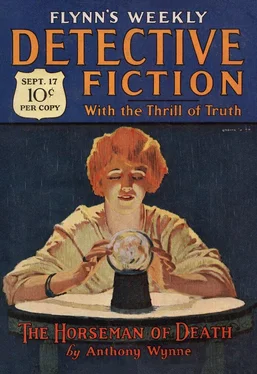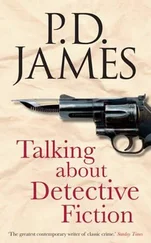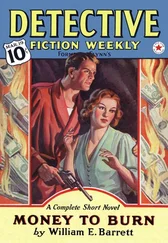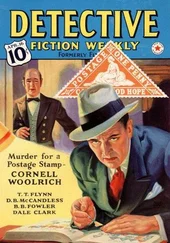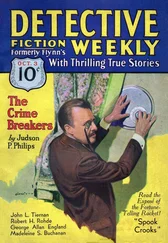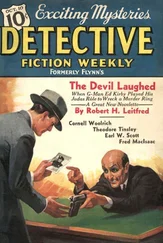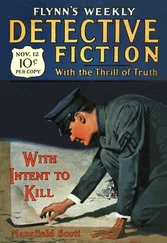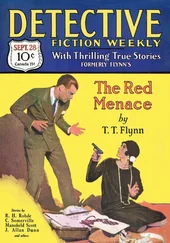Valentine - Flynn’s Weekly Detective Fiction. Vol. 27, No. 1, September 17, 1927
Здесь есть возможность читать онлайн «Valentine - Flynn’s Weekly Detective Fiction. Vol. 27, No. 1, September 17, 1927» весь текст электронной книги совершенно бесплатно (целиком полную версию без сокращений). В некоторых случаях можно слушать аудио, скачать через торрент в формате fb2 и присутствует краткое содержание. Город: New York, Год выпуска: 1927, Издательство: The Red Star News Company, Жанр: Детектив, на английском языке. Описание произведения, (предисловие) а так же отзывы посетителей доступны на портале библиотеки ЛибКат.
- Название:Flynn’s Weekly Detective Fiction. Vol. 27, No. 1, September 17, 1927
- Автор:
- Издательство:The Red Star News Company
- Жанр:
- Год:1927
- Город:New York
- ISBN:нет данных
- Рейтинг книги:5 / 5. Голосов: 1
-
Избранное:Добавить в избранное
- Отзывы:
-
Ваша оценка:
- 100
- 1
- 2
- 3
- 4
- 5
Flynn’s Weekly Detective Fiction. Vol. 27, No. 1, September 17, 1927: краткое содержание, описание и аннотация
Предлагаем к чтению аннотацию, описание, краткое содержание или предисловие (зависит от того, что написал сам автор книги «Flynn’s Weekly Detective Fiction. Vol. 27, No. 1, September 17, 1927»). Если вы не нашли необходимую информацию о книге — напишите в комментариях, мы постараемся отыскать её.
Flynn’s Weekly Detective Fiction. Vol. 27, No. 1, September 17, 1927 — читать онлайн бесплатно полную книгу (весь текст) целиком
Ниже представлен текст книги, разбитый по страницам. Система сохранения места последней прочитанной страницы, позволяет с удобством читать онлайн бесплатно книгу «Flynn’s Weekly Detective Fiction. Vol. 27, No. 1, September 17, 1927», без необходимости каждый раз заново искать на чём Вы остановились. Поставьте закладку, и сможете в любой момент перейти на страницу, на которой закончили чтение.
Интервал:
Закладка:
“Whew!”
A heavy sigh escaped the detective captain’s lungs and he made a gesture of despair.
“Don’t it beat hell?” he was speaking to Barrow. “Don’t it beat hell?”
The Citadel man nodded emphatically, but Inspector Conalan was cruel in his comment at this.
“I never in all my experience as a policeman,” he said, “and it has been considerable, ever knew of a prisoner that was taken with words.”
Druggan’s lips were set grimly.
“Neither have I,” he agreed. “That’s why I don’t use so many.”
Chapter V
Balcolm’s Last Bow
Druggan was worried after he had left the official presence, and there was cause for his restiveness. His climb to his present position in the police department was not made without its obstacles. Time and again he had risked all to bring offenders to justice, and the thought of losing out now was unbearable.
“That would be hard enough,” he told Barrow, “ but it’s doubly difficult to take what I’ve just taken from him. He never was a good policeman and never will be. It looks like I’m up against it for certain.”
Again Druggan was right. He was up against it. Just after Barrow left him he was summoned to the commissioner’s office and told by the chief executive of the department that perhaps a new captain was needed for the detective bureau.
“It looks to me, Druggan,” the commissioner told him, “that maybe you are going a little stale. Have you thought of that?”
“I have, Mr. Commissioner,” Druggan replied, “and I am not. The truth of the matter is that we have a super-crook, one who is unbelievably adroit and clever, to deal with and he has every man in the department stumped.
“The newspapers are raising hell about it and somebody has to be the goat. It looks to me like I’m tagged for the honor. I didn’t think this administration was operating that way.”
The commissioner was human. He liked Druggan.
“Pull a chair over here and sit down,” he directed him.
Druggan sat down.
There ensued five minutes of earnest conversation — one-sided conversation with Druggan supplying none of it save an occasional nod.
“And that’s the situation, captain,” the commissioner concluded. “I’m running this department and there is no politics involved. When I said perhaps you were getting stale I was honest. If you are not you know it better than I do. Stop worrying and try to get your man. I’m with you.”
He arose and Druggan, buoyed by this decent gesture from his commanding officer, thanked him.
A sincere handclasp was the commissioner’s response, and Druggan took his leave.
It would be interesting and satisfying to recount that the captain of detectives thereupon sauntered out into Center Street and found his tormentor. But such was not his luck. The days of investigation that followed and left Druggan a bleary-eyed picture of discouragement were as unproductive as the others had been.
Despite the renewal of police activity, the newspapers were as bitter as ever over the elusiveness of the killer-bandit. Druggan, and now even the commissioner, were lampooned by cartoonist and writer.
Citizens began to take mass action, spurred on by this concerted propaganda, and finally one organization, the Voters’ Union, which was devoted to attacking anything vulnerable in the matter of civil government, announced a great meeting, the purpose of which would be to demand immediate action by the authorities.
The principal speaker of the occasion was to be Colonel Bosworth J. Balcolm, banker and chairman of the board of the Coastwise Railroads system, a luminary with whom civic virtue was an obsession and who never missed an opportunity to enlist under its banner. Others almost as prominent were scheduled to address the throng of indignant.
The Garden was jammed to suffocation on the night the meeting was held, so crowded that overflow speeches were necessary.
Unhappy were the police who were assigned to maintain order. They heard themselves and their department raked fore and aft for their mutual failings. Grimly they stood their ground and glared defiantly at the emotional men and women who hissed at every mention of the uniform they wore.
And through it all, from the time the chairman uttered his first word, Balcolm sat in his seat on the platform wearing a satisfied grin. Who would forget for some time the speech he made as the crowd listened attentively?
“What utter nonsense they exude.” he thundered. “They, the ‘ finest.’ prattle like lisping babes about the ‘perfect crime,’ and say there is nothing they may do about it.
“We have seen two of our good citizens slain before our very eyes, figuratively, and robbery is rampant. We ask the police who have sworn to protect our lives and property what they are going to do about it. What is the answer?”
A pause, for the effect it might have.
“Nothing,” went on Bosworth J. Balcolm, “has been done by them. We are told the perpetrator of these outrages is clever, so smart that the New York police force cannot apprehend him.”
He smiled and cast his shot.
“And that,” he bellowed, “is probably true.”
He went on:
“This prattle of ‘perfect crime’ is the most arrant nonsense. There is no such thing and they know it. They know as police officers must know that there has been no crime since time began which could not be solved if the proper measures were taken. I say it again and defy contradiction. There is no perfect crime!”
He sat down amid a salvo of applause and listened smugly as the other speakers of the evening made their oratorical appeal to reason.
Presently the meeting adjourned, the band played the “Star Spangled Banner” while the crowd stood at attention, and then a spirited exit march started the mass of humanity for the doors, Balcolm escorted by the chairman. He liked to rub elbows with the common people.
They were passing through the proscenium just outside the arena when the chairman heard an exclamation escape the lips of Balcolm and caught his arm as he stumbled. Those in their vicinity turned at Balcolm’s cry and helped him as he assisted the guest of honor to a lounge near by.
Balcolm was gasping painfully as they lay him on the couch. He was unable to speak, and a physician was hurriedly summoned from the crowd.
“It seems to be a heart attack,” he told the bystanders, as he thrust his hand into the bosom of Balcolm’s shirt.
A look of bewilderment overcast the physician’s features as he withdrew his hand. It was covered with blood.
“God!” he exclaimed. “He’s been stabbed.”
And he hastily turned the banker over and ripped the clothing that covered the wound. A near panic followed among those of the audience who had stopped to witness this unscheduled scene.
Balcolm died immediately, as two stalwart policemen, grimly silent, stood by. The Garden was cleared and police headquarters were immediately notified of the tragedy.
Inspector Conalan, Captain Druggan and the commissioner himself arrived at the Forty-Ninth Street entrance to the big arena at the same time. They entered together and found some of the officers of the Voters’ Union with the body, now guarded by uniformed men.
Druggan strode directly to the couch, put his hand in Balcolm’s coat pocket, hoping against hope that he would find nothing, and drew forth a piece of white paper. Slowly he unfolded it and passed it to the commissioner. There, centered on the page, were the words:
Balcolm’s associates were inclined to be nasty about it. The chairman asked the commissioner:
“Well, what are you going to do about it now?”
Читать дальшеИнтервал:
Закладка:
Похожие книги на «Flynn’s Weekly Detective Fiction. Vol. 27, No. 1, September 17, 1927»
Представляем Вашему вниманию похожие книги на «Flynn’s Weekly Detective Fiction. Vol. 27, No. 1, September 17, 1927» списком для выбора. Мы отобрали схожую по названию и смыслу литературу в надежде предоставить читателям больше вариантов отыскать новые, интересные, ещё непрочитанные произведения.
Обсуждение, отзывы о книге «Flynn’s Weekly Detective Fiction. Vol. 27, No. 1, September 17, 1927» и просто собственные мнения читателей. Оставьте ваши комментарии, напишите, что Вы думаете о произведении, его смысле или главных героях. Укажите что конкретно понравилось, а что нет, и почему Вы так считаете.
